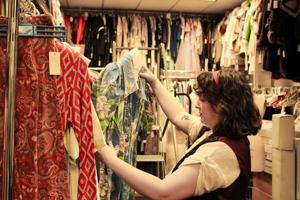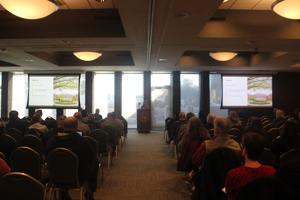Illinois State University College Democrats and College Republicans host annual debate
On Oct. 28, the Illinois State College Democrats and College Republicans had their annual debate Students gathered in the Brown Ballroom of the Bone Student Center to watch three representatives from each party go head-to-head. Nine questions were asked, the topics ranged from national to local issues. Some of the topics included criminalization of abortion, bans on assault weapons and campus safety. “I don’t think women should be prosecuted for the crime of abortion. I think criminalization should fall on the responsibility of the doctor. They know better. They know what abortion entails. They understand that life begins at conception, but they perform abortions for profit [and] political gain,” ISU College Republicans member Braiden Gonzalez said. While Gonzalez strongly expressed his opinion on the topic of abortion, ISU College Democrats representative Delaney Reynolds opposed. “The College Democrats stands with women and trusts their choices for their own bodies...First, I really want to address the separation between church and state. [The] First Amendment says [that] government should not impose religious beliefs on any individual. Many who oppose abortion do so based on personal or religious views. But our laws must reflect the diverse beliefs of the citizens in the United States,” Reynolds said. One topic both parties agreed on was student teachers’ wages. “Absolutely, we should be paying student teachers to ensure that we attract more diverse and more educated student teachers to benefit our future generation,” Reynolds said. Campus safety was covered, referencing an incident on campus this past August where a hate crime was reported. It was one of several incidents reported at ISU. The representatives were asked how they feel ISU should handle these situations. “We have to be proactive. We can’t have a hate crime incident occur...I want to stress the importance of ISU administrators being proactive and transparent. We’ve had issues with that in the past,” ISU College Democrats Alex Duffy said. Duffy also condemned the racism occurring, especially on the social media platform known as Yik Yak, following the recent “pop-up party” shooting. Both parties stated their desire to encourage students to get out and vote. “The purpose [of this debate] is to educate people, but I think more so this year is heavily important. We were seeing this almost as a final push to students on campus [to vote]. If you don’t know who you mare voting for, this is a great way to see who and what party you are voting with,” Reynolds said.
Latest Vidette
- Normal announces 2025 trick-or-treat hours and Halloween eventsThe town of Normal has officially released the hours for trick-or-treating from 5-8 p.m. on Friday, Oct. 31. The town officials remind families to follow the safety guidelines, including sticking to those houses that have exterior light, which indicates people are welcome to trick-or-treat, as well as the importance of using crosswalks and carrying flashlights or wearing reflective clothing. Throughout October, residents can enjoy a variety of Halloween-themed activities, including spooky movie screenings at the Normal Theater, the Haunted Trail along the Constitution Trail and family favorite activities at the Children’s Discovery Museum and the Treat Feast in Uptown Normal. Other important events include Witches Night Out on Oct. 24, a Potions Creations Workshop at Illinois Art Station, and Halloween programs at the Normal Public Library. For full event information, visit www.NormalIL.gov.
- Health and Public Service Career Fair to host variety of employersCareer Services is hosting a health and public service career fair from 2-5 p.m. Nov. 6 in the Prairie Room at the Bone Student Center. The event aims to give students the opportunity to meet with health and public service employers for full and part-time jobs. Career Advisor Nick Radcliffe said there are a few things students should do to prepare beforehand. “I would suggest first looking up which companies will be attending the fair. Students can see which companies are planning on attending the fair through the events page on the Career Services website,” Radcliffe said. “After looking through the list of employers, students should make a top-tier list of companies they are most excited to talk to,” Radcliffe continued. There will be over 20 different employers present for students to network with and apply to. Rachel Janicki, Career Services’ events coordinator, made note of what students can expect upon arrival. “Students will first check in with their student ID or ID number. Then, students can take their time meeting employers and checking out the other resources at the fair,” Janicki said. “The student lounge will be located inside the Resource Hub, where students can print resumes, have some coffee or water or just take some time to check out the fair map and plan [their] visit,” Janicki continued. Janicki highlighted the number of companies coming this year. “Employers are coming in from a variety of locations, like Carle Health and OSF HealthCare with many locations in central Illinois, and Cook County Sheriff’s Office and Northwestern Medicine from the Chicago area, among others,” Janicki said. Career Services will also offer free headshots for students in attendance. Headshots will be sent to each student's email by the end of the day. Janicki offered some final pieces of advice for students planning to attend. “Take initiative and don’t be afraid to start the conversation. No one is born with all the networking and communication skills they may need,” Janicki said. “I like to say that networking is just making professional friends. Employers are regular people just like you, so don’t be afraid to start conversations and ask questions. This applies to Career Services staff, too,” Janicki continued. More information can be found here.
- New Lois Jett Historical Fashion Collection Exhibition highlights clothing sustainabilityThe Lois Jett Historical Fashion Collection Exhibition explores how clothing repair practices have evolved from necessity to self-expression in its exhibit “Mending Matters: The Art and History of Caring for Clothes”. The exhibition is located in Illinois State University’s Turner Hall and invites students, faculty and community members to consider the personal and environmental value of clothing maintenance. Artifact Manager Katie Ibsen said she hopes the display will inspire a cultural shift away from modern fashion trends. “More generally speaking, I think people are getting tired of fast fashion and seeing the negative impact it has on the environment,” Ibsen said. “I really hope this exhibit helps people better understand the importance of taking care of the clothes that we already have, as well as to have a better appreciation for the art that is clothes mending,” Ibsen continued. Founded in 1962 by Fashion Design and Merchandising faculty member Lois Jett, the Lois Jett Historical Fashion Collection houses more than 2,000 national and international garments and accessories dating from as early as 700 C.E. The teaching collection’s exhibits rotate every semester and are open to the public. Many of the collection’s pieces are donated by professors, alumni and community members. The exhibition also highlights different mending philosophies. The “(In)visible Mending” theme refers to how individuals approach repairs—whether to conceal imperfections or turn them into creative statements. Another focus is upcycling, which is a movement that gained momentum in the 1990s as a response to overconsumption and landfill waste. It involves turning old or discarded garments into something of higher value. ISU’s Office of Sustainability and its “Fix it Friday” initiative are featured in the exhibit. The display includes the office’s repair kit, a beginner clothing repair guide and civic engagement awards, as well as a shirt showcasing the “Fix it Friday” slogan. By connecting past and present practices, Ibsen said the exhibition aims to remind visitors that fashion can be both expressive and responsible. The exhibit is open on Tuesdays, Thursdays and Fridays from 10 a.m. to noon and Wednesdays from 1-3 p.m. for the remainder of the fall semester in Turner Hall Room 126.
- RISE Town Hall Forum educates ISU community about budget planStudents, faculty and staff learned more about Illinois State University’s updated budgeting framework at the RISE Town Hall Forum. The forum took place from 10-11 a.m. Thursday in the Prairie Room at the Bone Student Center. Vice President for Academic Affairs and Provost Ani Yazedjian began by stating the purpose of this forum. “This is the starting point, and then we have a lot of work to do moving forward,” Yazedjian said. “Our goal, really, is the financial success of [ISU].” Yazedjian introduced Grant Thornton Managing Director Rick Strasser to the podium. He discussed the reasons for the budget redesign. “An important thing that has changed this year is mining the budget directly,” Strasser said. “I can say [that] in the past, that had not been the case here in the university. That is a recipe for spending your reserves in a way that is unsustainable at the university,” Strasser continued. Additionally, campus stakeholders had little visibility into their operating results and relied on resolutions when budgets exceeded revenue. Going forward, their mission is to build a resource allocation framework, deliver regular progress updates, build a model for multi-year financial planning, develop an allocation model to simplify decision making and collaborate using cross-functional teams in process and tool selection. Vice President for Finance and Planning Glen Nelson elaborated on their budget model and approach. “First, [our budget model] is going to be revenue-based. Our revenues define what we have available to spend,” Nelson said. “Second, we would have an all-funds approach. In other words, we would be managing resources all across the university, not just separately from [auxiliary facilities services],” Nelson continued. Nelson continued to explain the college-level budgeting plan to make strategic decisions at the university level. “[We] want [our budgeting plan] to be performance-based so that there is an incentive for games, senior leadership, managers and anyone who is over a budget,” Nelson said. Nelson said the budget model allocates revenues to align with enrollment by creating a concise dollar per student-credit-hour (SCH) and dollar per full-time equivalent (FTE). According to Nelson, they will be “taking the pie that [they] have and cutting it into pieces.” Additionally, the budget model will manage annual and rolling budget cycles, facilitate multi-year planning and empower colleges to manage resources as well as carry-forward balances. Nelson then gave an explanation of the FY24 and the expenditure. He said that there is currently $225 million in net tuition, fees and state appropriations. From this total, 58% is allocated to colleges and 42% is allocated to non-colleges. “It’s identified what the dollar amount is, and then each of the vice presidents will look at their departments, identify what their increased costs are … and we will tell the traditional budget on that side of the university,” Nelson said. Yazedjian elaborated on the potential risks of the budget redesign framework. These risks included a decline in enrollment and program cost imbalances. “What we are doing with this process is identifying the single source of truth for the data that we are using … and saying for this budget model these are the data points you use, everybody’s gonna know and everybody will see it,” Yazedjian said. Yazedjian stated their plan for success and the next steps they will be taking. They are going to finalize their budget model approach, develop revenue assumptions, release target dollars per SCH and FTE metrics and finalize the financial planning and analysis selection. Nelson concluded the forum by reiterating the key takeaways. “We’ve gone for simplicity versus precision. It’s designed to evolve … and a surplus has offset deficits, supporting constitutional resiliency,” Nelson said. Additional information about the budget redesign framework can be found here.
- RSO to know: Women in Business builds community and confidence on campusWomen in Business is an organization on campus that provides members with a way to grow both professionally and personally. It is open to all majors and gives students multiple ways to network and find internships and jobs. Junior business education major Abby Vandiver is currently serving as the 2025-2026 president of Women in Business. As the president of the organization, Vandiver is responsible for looking over all of the events and meetings. “One of the really cool things about my job as well is getting to be a part of the Student Leadership Advisory Board in the College of Business (SLAB),” Vandiver said. “Once a month, I get to meet with all the other presidents of other [registered student organizations] RSOs in the [College of Business] COB to discuss/collaborate on different events we may be having.” The organization hosts sponsored events, social events and fundraisers throughout the year. Vandiver's favorite memory from the club is connecting with members of the club during their events. “I look forward to every week and always enjoy getting to stay after our events and talk with other members,” Vandiver said. “There are nights that we may stay almost an hour after the event has ended just catching up with each other, and that is something that I love doing.” More information about WIB can be found on their Instagram.
- Former ISU student denied an appeal by Illinois Supreme CourtOn June 16, 1998, Christina McNeil was murdered in her home and found the next morning by her father, Barton McNeil, a former Illinois State University student. McNeil is now serving a 100-year sentence for the murder, but McNeil has maintained his innocence since first being accused. Now, 27 years later, McNeil faces his most recent denial for an appeal by the Illinois Supreme Court. McNeil, who is currently serving time at the Graham Correctional Center, is disappointed in the denial ruling. Still, he refuses to give up on the case and is determined to bring his daughter’s killer to justice. “In the last 25 years, my daughter’s cries for justice have been silenced. I am going to make sure that as many people as possible know the truth and get justice for Christina,” McNeil said. McNeil is not alone in this appeal denial. An inmate accused of armed robbery and murder in 199, Jamie Snow, has also been denied by the Illinois Supreme Court. While Snow has announced plans to seek clemency going forward, McNeil has admittedly stated he has no plans to seek clemency. “To receive clemency, a person has to admit to guilt and wrongdoing, which is something I will never do. I know I am innocent and refuse to admit to something I did not do,” McNeil said. McNeil believes that his ex-girlfriend, Misook Nowlin, is guilty of killing his daughter. Nowlin, who has denied these claims since the case first opened, is currently serving a 55-year sentence for the murder of her mother-in-law, Linda Tyda. Despite McNeil’s defense attorney entering DNA evidence and expert reports into evidence, a member of the 11th Judicial Circuit Court, Judge William Yoder, has ruled to deny this evidence being brought into the case. Fellow judge, and longtime witness and member of the case, Judge James Knecht, who has served for over 50 years as a judge in the state of Illinois, wished not to speak heavily on the case. However, Knecht did comment on the appeal system. “The appeals process exists so that every person can get their day in court and justice can be received,” Knecht said. McNeil has yet to give up hope and plans to do whatever he can to finally earn his innocence in court. McNeil’s cousin, Chris Ross, plans to soon host an event at Heartland Community College to spread awareness about McNeil’s case and wrongful convictions occurring in our justice system.













